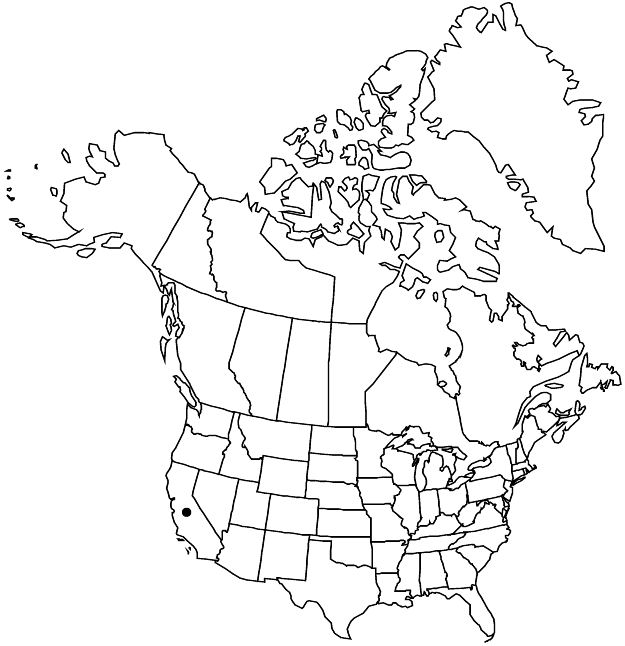Difference between revisions of "Ceanothus gloriosus"
Leafl. W. Bot. 2: 43. 1937.
FNA>Volume Importer |
imported>Volume Importer |
||
| (6 intermediate revisions by 2 users not shown) | |||
| Line 25: | Line 25: | ||
|distribution=Calif. | |distribution=Calif. | ||
|discussion=<p>Varieties 3 (3 in the flora).</p><!-- | |discussion=<p>Varieties 3 (3 in the flora).</p><!-- | ||
| − | --><p>Ceanothus gloriosus is composed of three varieties occurring along the northern California coast from Humboldt County to Marin County. Variety gloriosus and var. porrectus generally differ primarily by leaf shape, length and width, and the number of marginal teeth. Variety exaltatus differs from the other two varieties primarily in stature. Complex hybrids with C. cuneatus var. ramulosus, C. divergens, and C. sonomensis were studied by J. T. Howell (1940).</p> | + | --><p><i>Ceanothus gloriosus</i> is composed of three varieties occurring along the northern California coast from Humboldt County to Marin County. Variety gloriosus and <i></i>var.<i> porrectus</i> generally differ primarily by leaf shape, length and width, and the number of marginal teeth. Variety exaltatus differs from the other two varieties primarily in stature. Complex hybrids with <i>C. cuneatus </i>var.<i> ramulosus</i>, <i>C. divergens</i>, and <i>C. sonomensis</i> were studied by J. T. Howell (1940).</p> |
|tables= | |tables= | ||
|references= | |references= | ||
| Line 45: | Line 45: | ||
|-id=key-0-2 | |-id=key-0-2 | ||
|2 | |2 | ||
| − | |Leaf blades widely obovate to suborbiculate, 23–31(–45) × 17–24 mm, marginal teeth | + | |Leaf blades widely obovate to suborbiculate, 23–31(–45) × 17–24 mm, marginal teeth 13–31. |
|[[Ceanothus gloriosus var. gloriosus|Ceanothus gloriosus var. gloriosus]] | |[[Ceanothus gloriosus var. gloriosus|Ceanothus gloriosus var. gloriosus]] | ||
|-id=key-0-2 | |-id=key-0-2 | ||
|2 | |2 | ||
| − | |Leaf blades elliptic, obovate, or narrowly obovate, 10–21 × 5–15 mm, marginal teeth | + | |Leaf blades elliptic, obovate, or narrowly obovate, 10–21 × 5–15 mm, marginal teeth 9–19. |
|[[Ceanothus gloriosus var. porrectus|Ceanothus gloriosus var. porrectus]] | |[[Ceanothus gloriosus var. porrectus|Ceanothus gloriosus var. porrectus]] | ||
|} | |} | ||
| Line 56: | Line 56: | ||
-->{{#Taxon: | -->{{#Taxon: | ||
name=Ceanothus gloriosus | name=Ceanothus gloriosus | ||
| − | |||
|authority=J. T. Howell | |authority=J. T. Howell | ||
|rank=species | |rank=species | ||
| Line 68: | Line 67: | ||
|publication year=1937 | |publication year=1937 | ||
|special status=Endemic | |special status=Endemic | ||
| − | |source xml=https:// | + | |source xml=https://bitbucket.org/aafc-mbb/fna-data-curation/src/2e0870ddd59836b60bcf96646a41e87ea5a5943a/coarse_grained_fna_xml/V12/V12_743.xml |
|genus=Ceanothus | |genus=Ceanothus | ||
|subgenus=Ceanothus subg. Cerastes | |subgenus=Ceanothus subg. Cerastes | ||
Latest revision as of 19:17, 5 November 2020
Shrubs, 0.1–3 m, matlike to moundlike. Stems prostrate, spreading, ascending, or erect, sometimes rooting at proximal nodes; branchlets green to brown or reddish brown, flexible to rigid, strigillose or tomentulose. Leaves not fascicled, not crowded; petiole 1–4 mm; blade flat to ± cupped or folded lengthwise adaxially, widely elliptic, obovate, or suborbiculate, 10–40(–45) × 5–24 mm, base cuneate to ± rounded, margins not revolute, sometimes slightly thickened, dentate to denticulate most of length, teeth 9–35, apex rounded, truncate, or retuse, abaxial surface pale green, sparsely strigillose or glabrate, adaxial surface dark green, ± shiny, glabrous. Inflorescences axillary, 0.9–2.5 cm. Flowers: sepals, petals, and nectary deep blue to bluish purple. Capsules 4–6 mm wide, lobed; valves usually smooth, sometimes rugulose or crested distal to middle, horns subapical, minute, not rugose, intermediate ridges absent.
Discussion
Varieties 3 (3 in the flora).
Ceanothus gloriosus is composed of three varieties occurring along the northern California coast from Humboldt County to Marin County. Variety gloriosus and var. porrectus generally differ primarily by leaf shape, length and width, and the number of marginal teeth. Variety exaltatus differs from the other two varieties primarily in stature. Complex hybrids with C. cuneatus var. ramulosus, C. divergens, and C. sonomensis were studied by J. T. Howell (1940).
Selected References
None.
Lower Taxa
Key
| 1 | Shrubs 0.8–3 m; stems erect to ascending. | Ceanothus gloriosus var. exaltatus |
| 1 | Shrubs 0.1–0.5 m; stems prostrate to spreading. | > 2 |
| 2 | Leaf blades widely obovate to suborbiculate, 23–31(–45) × 17–24 mm, marginal teeth 13–31. | Ceanothus gloriosus var. gloriosus |
| 2 | Leaf blades elliptic, obovate, or narrowly obovate, 10–21 × 5–15 mm, marginal teeth 9–19. | Ceanothus gloriosus var. porrectus |
